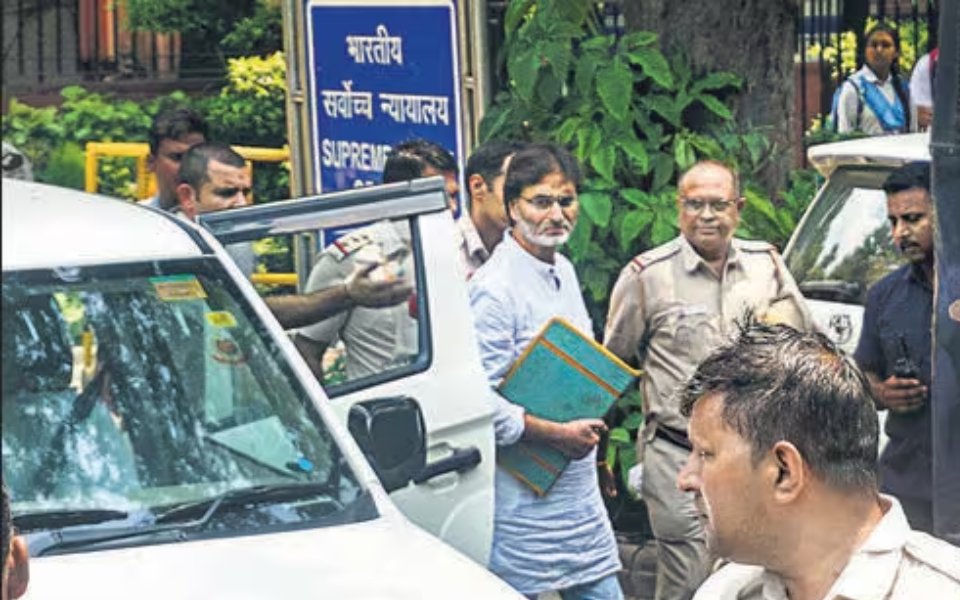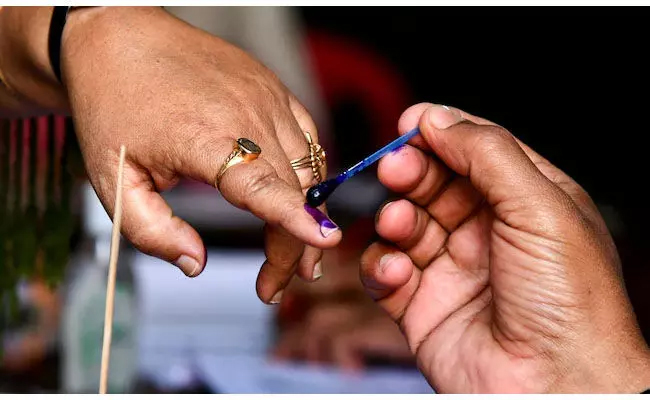New Delhi, Jul 21: Solicitor General of India Tushar Mehta wrote to Union Home Secretary Ajay Kumar Bhalla on Friday flagging a "serious security lapse" after Jammu Kashmir Liberation Front (JKLF) chief Yasin Malik, serving life term in Tihar jail, was brought to the Supreme Court for attending a case proceeding.
"It is my firm view that this is serious security lapse. A person with terrorist and secessionist background like Yasin Malik who is not only a convict in terror funding case but has known connections with terror organisations in Pakistan could have escaped, could have been forcibly taken away or could have been killed," Mehta wrote.
He said that even the security of the Supreme Court would have been put to a serious risk if any untoward incident were to happen.
Mehta highlighted that there is an order passed by the Ministry of Home Affairs with regard to Malik under section 268 of the Criminal Code of Procedure which prevents the jail authorities to bring the said convict out of the jail premises for security reasons.
"In any view of the matter so long as the order under section 268 of CrP Code subsists, jail authorities had no power to bring him out of jail premises nor did they have any reason to do so," he said, adding, "I consider this to be a matter serious enough to once again bring it to your personal notice so that suitable action/steps can be taken at your end."
Malik appeared in the top court when a bench headed by Justice Surya Kant was hearing an appeal filed by the Central Bureau of Investigation (CBI) against the September 20, 2022 order of a trial court in Jammu in the 1989 kidnapping of Rubaiya Sayeed, the daughter of then Union home minister Mufti Mohammad Sayeed.
The CBI has appealed against the Jammu court order directing that Malik be produced before it physically on the next date of hearing so that he can be given an opportunity to cross-examine the witnesses of the prosecution in the Rubaiya Sayeed kidnapping case.
In his letter, Solicitor General Mehta gave details of the incident and said that on Friday everyone was shocked when news was received that the jail authorities are bringing Malik personally to appear before the apex court "as per his desire to appear as party in person".
"I had telephonically intimated you about this fact. However, by that time Yasin Malik had already reached the precincts of the Supreme Court of India," he said.
The top law officer said that neither the court had summoned his personal presence nor was any permission taken from any authority of the apex court in this regard.
"When I enquired from the officer who was in-charge of the security of Yasin Malik in the Supreme Court, the only thing he could show me was a printed notice in a general format of the Supreme Court which is sent with regard to every party to any matter in the court. The said printed notice informs the recipients of the notice to appear before the court either in person or through an authorised advocate.
"This is not either the permission of the Supreme Court to bring a convict facing an order under section 268 of CrPC to come out of jail nor it is requiring mandatory personal presence of the recipient of the order," he wrote.
Mehta said the jail authorities must be receiving hundreds of such orders/notices daily and have never construed any such order requiring personal presence of either any accused or any convict much less a convict having an order under section 268 of CrPC operating against him.
Rubaiya Sayeed was abducted from near Lal Ded Hospital in Srinagar on December 8, 1989. She was freed five days later after the then V P Singh government, supported by the BJP, at the Centre released five terrorists in exchange.
Now living in Tamil Nadu, Rubaiya Sayeed is listed as a prosecution witness by the CBI, which took over the case in early 1990.
Malik, 56, is lodged in Tihar Jail after he was sentenced by a special National Investigation Agency (NIA) court in May last year. He was arrested in early 2019 in connection with the 2017 terror financing case registered by the NIA.
Let the Truth be known. If you read VB and like VB, please be a VB Supporter and Help us deliver the Truth to one and all.
Thane (PTI): Authorities have seized illegally stored 1,839 gas cylinders and seven vehicles worth over Rs 67 lakh in the Dombivli MIDC area of Thane district, officials said on Saturday.
A special vigilance team of the Mumbai Rationing Department detected an illegal storage of domestic and commercial LPG cylinders in Phase-2 of Dombivli (East).
Cylinders belonging to multiple gas agencies were found stockpiled in closed vehicles, unauthorised warehouses, and open sheds without mandatory permissions from the Explosives Department, Fire Department, or oil companies, according to an official release.





